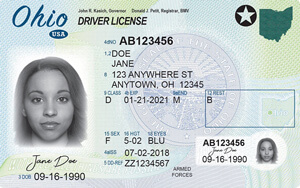- Updated for April 2025
- Based on official Ohio 2025 Driver's manual
Free Ohio BMV Motorcycle Permit Practice Test 2025
Ohio is known for its winding roads, particularly in the Appalachian region. The scenic byways that wind through this region are best explored on two wheels, but the diverse landscape also presents its own challenges. The weather can change quickly during spring and fall, requiring you to ride carefully and adapt to rainy conditions. We know you’re eager to discover the Buckeye State on your favorite cruiser, but you must go through the learning phase first. Start by studying the official BMV motorcycle operator manual (Ohio Motorcycle Manual). This valuable resource contains useful information on riding theory, including basic vehicle control, wearing the right gear, and keeping a safe distance from other road users.
Our Ohio Ohio motorcycle permit practice tests give you the opportunity to evaluate your knowledge before the exam day comes. Each practice test consists of 30 multiple-choice questions based on the official motorcycle operator manual. All you need to access this tool is an active internet connection and a device that supports a browser. You get unlimited attempts to practice as often as you wish. With non-stop access, you can integrate multiple training sessions into your schedule. If you spend long hours training with this intuitive tool, we recommend taking frequent breaks to avoid burnout and digital eye strain. Getting licensed in Ohio is not a race; you shouldn’t rush the learning phase. Build the foundation for your riding skills with patience and perseverance, progressing to the next steps only after you’re confident in your knowledge.
Students who struggle to understand the content of the official motorcycle operator manual can use our Ohio motorcycle permit practice tests for educational purposes. We provide immediate feedback for every question in the form of a detailed explanation that highlights the correct answer. This allows you to identify mistakes as soon as they occur and strengthen your knowledge with the help of our automated assistant, which can provide real-life examples and valuable insight.
- Perfect for learner’s permit, driver’s license, and Senior Refresher Test
- Triple-checked for accuracy
What you need to know

What to expect on the actual OH BMV exam
questions
correct answers to pass
passing score
minimum age to apply
List of questions (classic view)
- Because a motorcycle has a smaller profile than a car,
- The best eye and face protection is provided by
- You should adjust your side mirrors
- A motorcycle is the right size for you if
- ___________ can increase your visibility.
- While your feet are on the footrests, you should AVOID
- You are turning right onto a road with one lane of traffic in each direction. If you ride through the turn too fast, you may
- ____________ helps make your downshifting smoother.
- You should leave at least a ______-second following distance behind the vehicle ahead of you.
- In the "press" step of turning, you press
- If you are being passed on the left by another vehicle, which lane position should you ride in?
- If your motorcycle will take longer to stop, you should
- If another driver is tailgaiting you, the best course of action is to
- To prevent a car driver from trying to share your lane, you should
- If your motorcycle was built before 1978, what must you remember?
- To give yourself enough time to react to hazards, you should scan the road ________ ahead.
- Head checks while riding
- The best clothing for making yourself visible is
- You can initiate a swerve by
- How do you achieve maximum straight-line braking?
- The pavement is likely to be slippery
- If your front tire fails while you're riding, you should
- If your throttle is stuck and you can't free it, you should
- A passenger under 18 years of age who rides your motorcycle must have his or her own
- Motorcycle cargo should NOT be secured with
- What should you do on Step 3 of passing?
- When you are being passed from behind,
- Which portion of the lane should you be in before starting to pass?
- What should you do to avoid colliding with a vehicle cutting in?
- As you are riding, an object appears suddenly in your path. What should you do?
- Alabama: Test 1 / Test 2
- Alaska: Test 1 / Test 2
- Arizona: Test 1 / Test 2
- Arkansas: Test 1 / Test 2
- California: Test 1 / Test 2
- Colorado: Test 1 / Test 2
- Connecticut: Test 1 / Test 2
- Delaware: Test 1 / Test 2
- District of Columbia: Test 1 / Test 2
- Florida: Test 1 / Test 2
- Georgia: Test 1 / Test 2
- Hawaii: Test 1 / Test 2
- Idaho: Test 1 / Test 2
- Illinois: Test 1 / Test 2
- Indiana: Test 1 / Test 2
- Iowa: Test 1 / Test 2
- Kansas: Test 1 / Test 2
- Kentucky: Test 1 / Test 2
- Louisiana: Test 1 / Test 2
- Maine: Test 1 / Test 2
- Maryland: Test 1 / Test 2
- Massachusetts: Test 1 / Test 2
- Michigan: Test 1 / Test 2
- Minnesota: Test 1 / Test 2
- Mississippi: Test 1 / Test 2
- Missouri: Test 1 / Test 2
- Montana: Test 1 / Test 2
- Nebraska: Test 1 / Test 2
- Nevada: Test 1 / Test 2
- New Hampshire: Test 1 / Test 2
- New Jersey: Test 1 / Test 2
- New Mexico: Test 1 / Test 2
- New York: Test 1 / Test 2
- North Carolina: Test 1 / Test 2
- North Dakota: Test 1 / Test 2
- Ohio: Test 1 / Test 2
- Oklahoma: Test 1 / Test 2
- Oregon: Test 1 / Test 2
- Pennsylvania: Test 1 / Test 2
- Rhode Island: Test 1 / Test 2
- South Carolina: Test 1 / Test 2
- South Dakota: Test 1 / Test 2
- Tennessee: Test 1 / Test 2
- Texas: Test 1 / Test 2
- Utah: Test 1 / Test 2
- Vermont: Test 1 / Test 2
- Virginia: Test 1 / Test 2
- Washington: Test 1 / Test 2
- West Virginia: Test 1 / Test 2
- Wisconsin: Test 1 / Test 2
- Wyoming: Test 1 / Test 2
Your go-to, trusted source
Experience the Driving-Tests differenceOur commitment to accuracy and quality in our practice tests
Explore our rigorous, multi-tiered verification process that ensures each question mirrors the official manual for unparalleled accuracy.

At Driving-Tests.org, we understand the importance of reliable and accurate practice tests to help you prepare for your DMV exam. That's why we've developed a meticulous process to create and continually update our practice questions, ensuring they reflect the most current driving laws and regulations.
Here's an inside look at how we maintain the highest quality in our practice tests.
Content Creation and Verification Process
- Alignment with Official Manuals:
Every question we develop is based on the most recent version of each state's official driving manual. Our team regularly monitors each state DMV's website for the latest updates to ensure our practice tests are always aligned with the most current information. - Community Feedback Integration:
We leverage feedback from our vast community of users to understand which topics are most frequently tested. This helps us focus on the areas that are most relevant and beneficial for your preparation. - Expert Content Creation:
Our in-house editor, Steven, who has extensive experience in driver education, crafts each question with precision. He conducts a thorough review of each question against the official manuals to ensure accuracy. - Rigorous Review Process:
Once Steven has finalized a set of questions, our team conducts a joint review session. This second level of scrutiny involves content accuracy, proofreading, and fact-checking to eliminate any errors. - User Feedback Mechanism:
After a question goes live on our site, we keep the lines of communication open. Each question features a feedback button, inviting users to report any issues or errors. This continuous feedback loop allows us to address and rectify any concerns promptly. - Responsive Updates:
In line with our commitment to accuracy, we quickly update our practice questions to reflect any changes in the DMV manuals. Additionally, we update the free electronic copy of the state's driver's license manuals on our site, typically within a few days after the DMV publishes them.
Our thorough quality control process ensures that you have access to practice tests that are as accurate and up-to-date as possible. We believe in the power of well-prepared drivers and are dedicated to providing you with the best study tools to help you succeed on your DMV exam.
Pass the First Time. Guaranteed.
Be fully prepared in days, not weeks. Get full access to our entire program, starting at $49.
950 Exam-Like Questions
Unlock state-specific questions vetted by DMVs and seen on the official exam.
Industry-Leading 97% Success Rate
Compare with the average US passing rate of 49%.
Trusted by over 1.15 Million customers
The only program recommended by DMVs.

